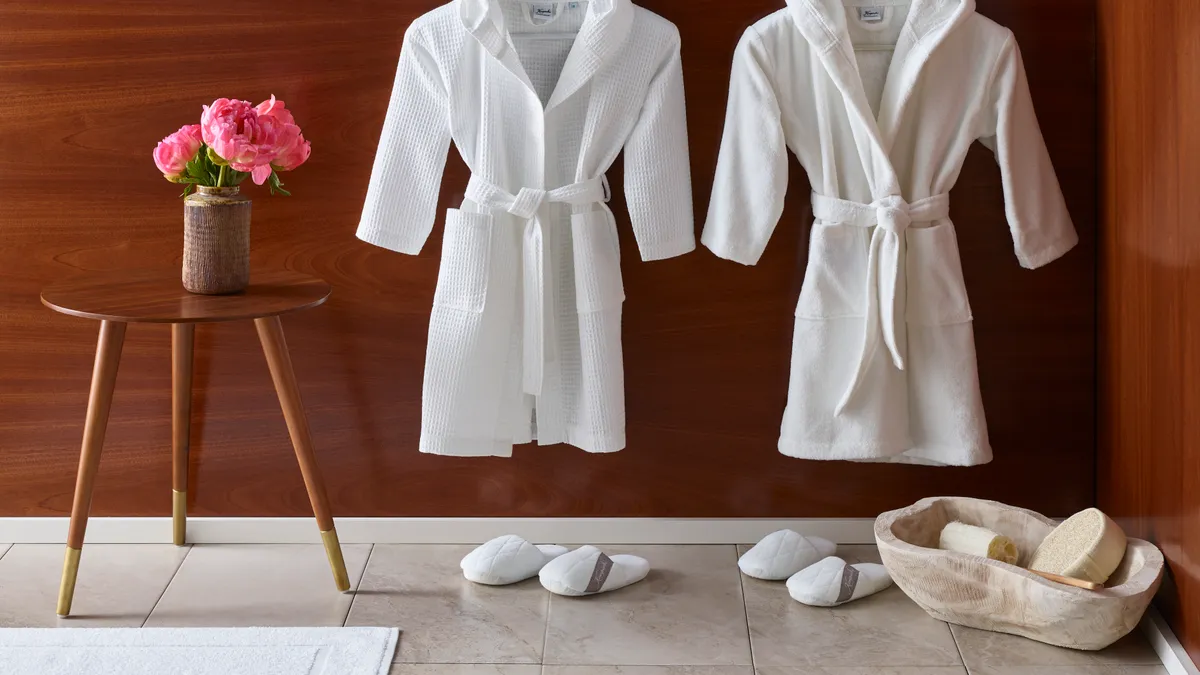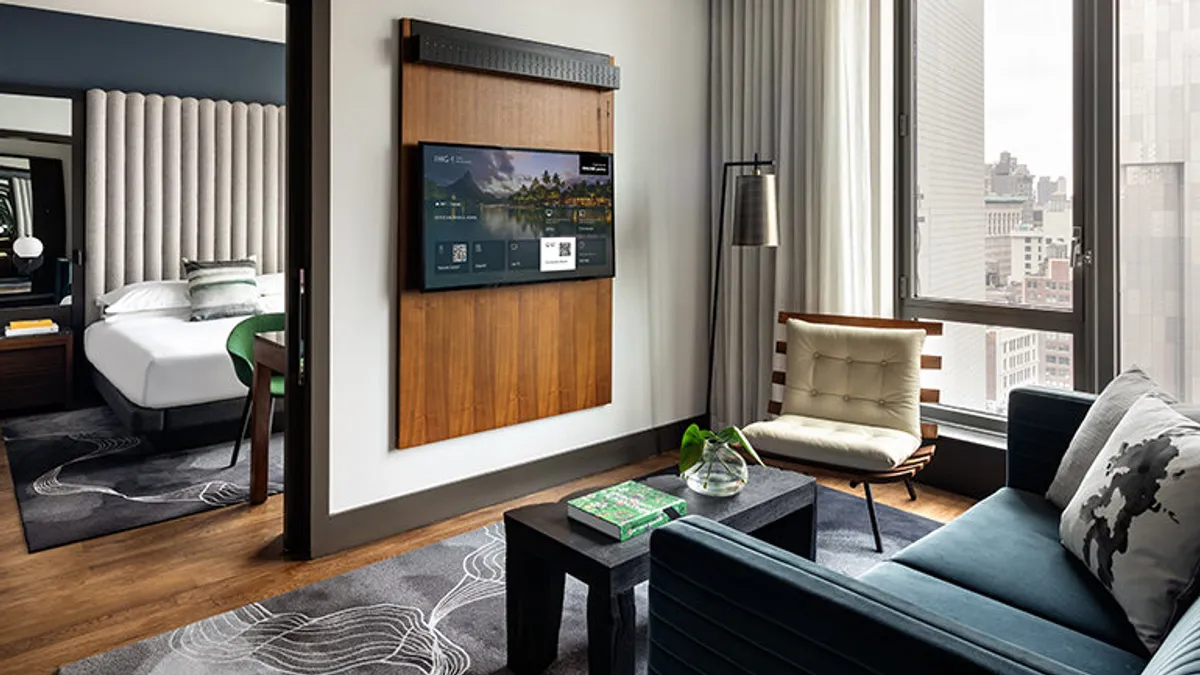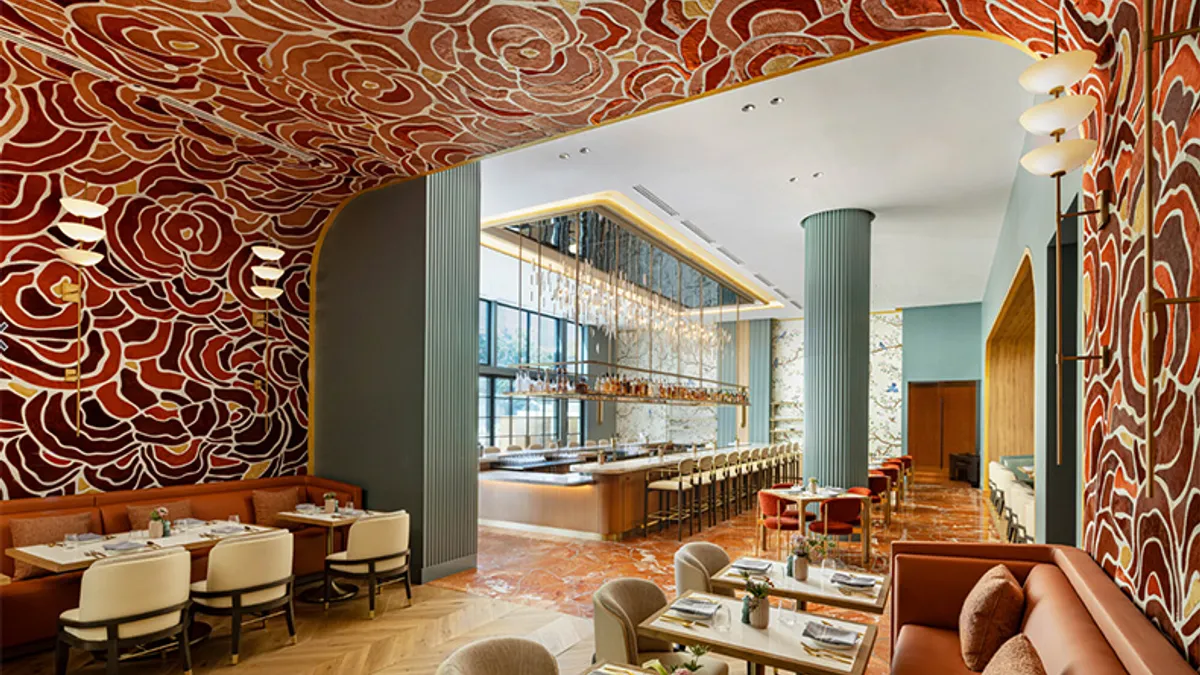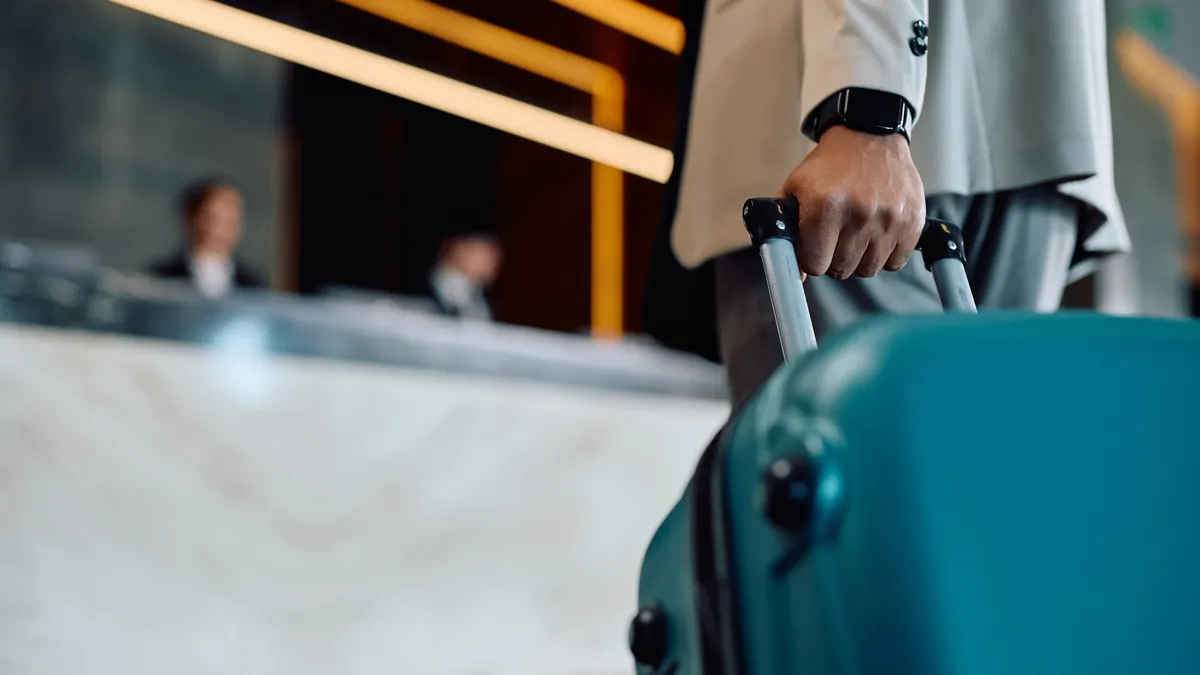Four Seasons’ bed linens and JW Marriott’s shampoo aren’t just for guests staying in the hotels anymore. The items are available for sale on dedicated websites, so customers can cozy up in Four Seasons sheets at home, or wash their hair with JW Marriott Ylang Ylang Shampoo in their own shower.
For decades, selling in-room items has been a powerful way for hoteliers to earn revenue and enhance the guest experience. With the advent of e-commerce, luxury hotel chains could more seamlessly sell and ship products, forging deeper connections with their guests and reminding customers of the brand in everyday life.
“When our guests use a candle with a signature scent from one of our hotels or sleep on their own hotel mattress at home, they are transported back to their hotel stay,” said Dana Hopp Peritz, vice president of retail and experiences at Marriott International.
Selling in-room items can boost loyalty by keeping a hotel brand top of mind, and encouraging guests to return for future stays. Meanwhile, advanced technology allows hoteliers to cater to guests’ desires more effectively than ever — and that includes selling them in-room products.
“With data analytics, we know so much more about our guests that are staying in our hotels,” said Kasia Russell, EVP of development at hospitality consultancy HVS. “There's really a bright spot and opportunity to expand the retail commerce for hotels.”
Heavenly Bed kicks off a trend
Hotel industry experts credit Westin for starting the trend of hotels selling in-room items to guests.
In 1999, the then-Starwood brand debuted its Heavenly Bed with a pillow-top mattress, a down blanket and crisp sheets. The bed proved so popular that guests wanted it in their homes, and Westin soon started offering it for sale through a catalog and a hotline that was “flooded with calls,” according to a Starwood press release from the time.
“That was the turning point of retail in the hotel industry,” said hotel operations consultant Sam Hilton.
By 2012, Westin had sold more than $125 million worth of its beds, pillows and scented products.
It can be a great little revenue source, because people are actually willing to pay more for those products that they really love and that remind them of their experience.

Kasia Russell
EVP of development at HVS
Fast-forward to today, and several high-end hotels have set up online storefronts of their own. The trend is most common among luxury hoteliers, which tend to offer a higher caliber of products, according to Jan Freitag, national director for hospitality market analytics at CoStar.
“When people stay with you, what can they take home that makes the trip tangible after they've checked out?” Freitag said. A customer might stay in the hotel, try the soap and think, “Man, this makes me feel like a million dollars. I want to be part of it.”
Listening to guests’ desires is a best practice, Russell said. When she worked in hotels, Russell would frequently hear about the bathrobes or lotions that guests loved. Hotels can use guest feedback to put the product on shelves, whether it’s in the gift shop, on a retail wall or online.
That’s exactly what Kempinski did when it started its online store about two years ago. Guests staying at the luxury hotel’s properties would ask to purchase bed linens, bathrobes and other amenities, “so we felt it would be the right way forward to offer these items on a dedicated webshop,” said Noel Attard, CEO of Kempinski Trading DMCC, which created the Kempinski Boutique.
Marriott also set up individual websites for its brands, such as The Ritz-Carlton Shops and Luxury Collection Store, when it heard from guests seeking products in the rooms.
“They were taking apart the bedding to find out who made the mattresses, asking our hotel associates where they could purchase the items in the rooms, or even casually packing robes in their bags to take home,” said Marriott’s Hopp Peritz. “We wanted to make it easy for our guests to bring home our products and recreate that travel experience at home.”
Bed and bath products are among the most common items guests seek to purchase, but hoteliers can stand out if they “have truly unique products and products that are tied to the brand,” said Amanda Belarmino, associate professor at the University of Nevada, Las Vegas’ William F. Harrah College of Hospitality.
If we can give something that the customer can use on a daily basis, your brand name crosses their mind every single day.

Sam Hilton
hotel operations consultant
Belarmino said some hotels sell the original artwork in their rooms. MGM Grand offers a lion statue, a small version of the one in the Las Vegas hotel’s lobby. DoubleTree, famous for its chocolate chip cookies, sells not only a tin of six cookies but also a candle scented like the treat.
“It can be a great little revenue source, because people are actually willing to pay more for those products that they really love and that remind them of their experience,” Russell said.
The loyalty play
Russell emphasized, however, that revenue is not the main goal. Attard similarly expressed that Kempinski did not create its online shop with revenue in mind. Instead, “it supports our brand awareness and is a great way to add to the Kempinski guest’s journey.”
Brand loyalty is the main driving force behind hotels selling their wares. Russell described a “cross pollination” between in-room items and what guests have at home. Each time a customer sleeps at home, they’re reminded of the mattress and linens at the hotel. When a customer showers, the scent helps them recall the hotel experience.
“If we can give something that the customer can use on a daily basis, your brand name crosses their mind every single day,” Hilton said.
Selling items is not an infallible strategy, however. If the purchased product differs from the one in the hotel or is poor quality, that can backfire, according to Russell. There’s also the question of exclusivity, Freitag said, and if making items available for purchase dilutes the hotel experience.
“Does it cheapen the brand?” Freitag said. “If you pride yourself in something that is super high end, part of the exclusivity is that not everybody can have it.”
Getting personal with products
Despite a few drawbacks, hotel experts said the advantages of selling their wares greatly outweigh risks, and they predict the trend will accelerate.
In June, Marriott launched a collaboration with Pottery Barn to sell a Westin Heavenly bed frame, along with other bedroom furniture, bedding and bath accessories. Kempinski is expanding its linens, “including colorful linen which are more ideal for homes, and which our guests have asked for,” Attard said.
Guest feedback is critical as hoteliers make decisions on how to expand their retail sales, and it’s even easier to gather thanks to data and technology. When guests stay at a hotel, they can input preferences in the hotel’s app, such as requesting a foam pillow. This data helps hotels customize the experience not only at the property, but also for future stays and at home.
Sam Hilton predicts automated subscriptions could be the next frontier in hotel’s retail sales. If a customer orders shampoo, AI can estimate when that guest is due for a refill and automatically place an order. That guarantees a repeat customer and emphasizes brand loyalty as the customer continues using the product at home.
“These items are going to be more customized and personalized to the customer's needs,” Sam Hilton said. “It's going to be a big thing in the upcoming few years.”

















